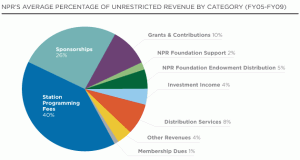In the days since Juan Williams’ firing, people have begun calling for a “de-funding” of NPR. But how much federal money actually goes to NPR? Andrew Phelps of WBUR posted on Hubbub a chart of NPR’s funding sources:
Phelps writes:
I said it before, but I’ll say it again: NPR receives no direct funding from the federal government for operations…
The largest share of NPR funding comes from its member stations (including WBUR).
The local stations receive some funding from the Corporation for Public Broadcasting, a taxpayer-funded, nonprofit, private corporation, created by Congress in 1967. (Think of it like the Red Cross.)
NPR does receive grants from CPB for special projects, but that funding is not included as part of the network’s operations budget.
So while federal dollars do flow to NPR, the connection is indirect. It may be a fine point, but it’s an important distinction. The federal government can’t “defund” NPR. What Congress can do is cut CPB funding — which has diminished over the years and has, at times, been threatened.
For more Hubbub, go here. For Andrew Phelps’ personal page, go here.

